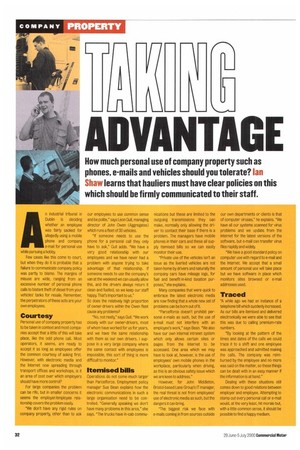A VANTAGE
Page 34

If you've noticed an error in this article please click here to report it so we can fix it.
How much personal use of company property such as phones, e-mails and vehicles should you tolerate? Ian Shaw learns that hauliers must have clear policies on this which should be firmly communicated to their staff.
n industrial tribunal in Dublin is deciding whether an employee was fairly sacked for allegedly using a mobile phone and company e-mail for personal use while pursuing a hobby Few cases like this come to court, but when they do it is probable that a failure to communicate company policy was partly to blame. The margins of misuse are wide, ranging from an excessive number of personal phone calls to blatant theft of diesel from your vehicles' tanks for resale. Remember, the perpetrators of these acts are your own employees,
Courtesy
Personal use of company property has to be taken in context and most companies accept that a little of this wril take place, like the odd phone call. Most operators, it seems, are ready to accept it as long as employees offer the common courtesy of asking first. However, with electronic media and the Internet now spreading through transport offices and workshops, is it an area of cost over which employers should have more control?
For large companies the problem can be rife, but in smaller concerns it seems the employer/employee relationship covers the problem easily.
"We don't have any rigid rules on company property, other than to ask
our employees to use common sense and be polite," says Leon Gull, managing director of John Owen (Aggregates) which runs a fleet of 30 vehicles.
"If someone needs to use the phone for a personal call they only have to ask," Gull adds. "We have a very good relationship with our employees and we have never had a problem with anyone trying to take advantage of that relationship. If someone needs to use the company's van at the weekend we can usually allow this, and the drivers always return it clear and fuelled, so we keep our staff happy. That's important to us."
So does the relatively high proportion of owner-drivers within the Owen fleet cause any problems?
"No, not really," says Gull. "We work closely with our owner-drivers, most of whom have worked for us for years, and we have the same relationship with them as our own drivers. I suppose in a very large company where the same contact with employees is impossible, this sort of thing is more difficult to monitor.'
Itemised bills
Operations do not come much larger than Parcelforce. Employment policy manager Sue Bean explains how the electronic communications in such a large organisation need to be controlled, "Generally speaking we don't have many problems in this area," she says. "The trucks have in-cab commu nications but these are limited to the outgoing transmissions they can make, normally only allowing the driver to contact their base if there is a problem. The managers have mobile phones in their cars and these all supply itemised bills so we can easily monitor their use.
"Private use of the vehicles isn't an issue as the livened vehicles are rot taken home by drivers and naturally the company cars have mileage logs, for fuel and benefit-in-kind taxation purposes," she explains.
Many companies that were Quick to embrace the latest electronic media are now finding that a whole new set of problems can be born out of it.
"Parcelforce doesn't prohibit personal e-mails as such, but the use of e-mail must not interfere with an employee's work," says Bean. We also have our own internal intranet system which only allows certain sites or pages from the Internet to be accessed. One area which we may have to look at, however, is the use of employees' own mobile phones in the workplace, particularly when driving, as this is an obvious safety issue which we are keen to address," However, for John Middleton, Bristol-based Lane Group's IT manager, the real threat is not from employees' use of electronic media as such, but the dangers it can bring.
"The biggest risk we face with e-mails coming in from sources outside our own departments or clients is that of computer viruses," he explains. "We have all our systems scanned for virus problems and we update from the Internet for the latest versions of the software, but e-mail can transfer virus files rapidly and widely.
'We have a good standard policy on computer use with regard to e-mail and the Internet. We accept that a small amount of personal use will take place but we have software in place which monitors sites browsed or e-mail addresses used.
Traced
while ago we had an instance of a telephone bill which suddenly increased. As our bills are itemised and delivered electronically we were able to see that this was due to calling premium-rate numbers.
"By looking at the pattern of the times and dates of the calls we could trace it to a shift and one employee was approached and admitted making the calls. The company was reimbursed by the employee and no more was said on the matter, so these things can be dealt with in an easy manner if the information is at hand."
Dealing with these situations still comes down to good relations between employer and employee. Attempting to stamp out every personal call or e-mail would, at the very least, hit morale but, with a little common sense, it should be possible to find a happy medium.












































































































